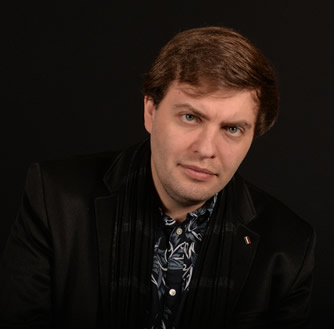The Raleigh Symphony Orchestra, in Meredith College‘s Jones Auditorium, kicked off the Sixth Annual Paderewski Piano Festival with works for strings, full orchestra, and orchestra with piano soloist. I’d been hearing, well ahead, about the guest soloist, Hubert Rutkowski, and he more than lived up to the advance word with a bravura performance. While the concert started later than is usual for a Sunday show (at 8 PM), it was also much shorter than usual, so it came out in the wash.
Of the four pieces on the program, three were by composers never before presented by the RSO in its forty years. The first of the previously unperformed was Three Pieces in Old Style by Henryk Górecki (1964), for string orchestra. By the time this was written, Górecki had grown out of his earlier harsh, atonal style, opting for something more digestible and betimes soporific. This piece is obscure to most, but many will have heard his Symphony No. 3, “Symphony of Sorrowful Songs,” which is quite similar in style. Three Pieces is ten minutes long but probably would have been better done in five. The first and last of the three are what string players call “goose-egg” music; whole and half notes, with nothing filled in. Such is frequently found in scores by composers not terribly familiar with strings. This reminds me of many conversations I’ve had with the general public, most of whom have little contact with or awareness of classical music. People will tell me something to the effect that “I love classical music; I put it on when I want to fall asleep.” Depressingly enough, this is an effective marketing strategy. The RSO strings played the score skillfully, and conductor Jim Waddelow brought his customary due diligence and musicality to the performance; but the score’s shortcomings were a bit too much to surmount. The audience gave the minimal polite and brief applause.
Next up was Frédéric Chopin’s Andante Spianato et Grande Polonaise Brillante, first performed in 1835 when Chopin was 25 years old. This curious work started off as just a polonaise, in 1830, for piano and orchestra; four years later he added the first movement, for piano alone. This was the first of two vehicles for Rutkowski, who strode on the stage in a white jacket, black pants, and black shoes with bright red shoelaces. It was clear from early on that he knows his way around the keyboard; it is no accident that he has performed in many countries and won or placed in quite a few prestigious contests. These include winning the International Chopin Piano Competition in Hannover (2007). He is now the artistic director of the Chopin Festival in Hamburg and a professor of piano and head of the piano department at the Hochschule für Musik und Theater there. So, the guy has credentials to burn, and by gum, it shows.
The composition is designed as a showpiece, but the piano part has real musical merit. That’s less in evidence for the orchestral writing. Chopin is notorious for being pianocentric in all regards, and his orchestration is the gravest of his few compositional flaws. After a flourish to begin the second of the two movements, much if not most of the time the orchestral musicians sat with their axes in their laps while the piano stormed away. It’s no wonder that Chopin gave up bothering with orchestral parts after this and just played in salons. Why bother with the masochistic load of copy work that orchestras require, not to mention rehearsals and paychecks, when you’re not using the forces at hand? The audience was delighted by the performance, and the RSO did the best they could with the little they were given to play.
After intermission, we were treated to Spanish Dances, Op. 12, No. 2 and No. 5 by Moritz Moszkowski. Paderewski said “After Chopin, Moszkowski best understands how to write for the piano, and his writing embraces the whole gamut of piano technique.” Moszkowski’s compositions are showpieces, for the most part, including these dances, originally for piano duet. They were later arranged for orchestra by Phillip Scharwenka, who did an admirable job. The style is of its time, the 1880s; Moszkowski considered Scriabin, Debussy, and other contemporaries to be “artistic madmen.” Not a bad piece, but clearly on the B list. This is one of a long list of compositions of Spanish music written by non-Spaniards.
Ending the program was Fantasie Polonaise Op. 19, by Ignacy Jan Paderewski, the star of the festival. Quite the celebrity in his time, continuing the legacy and example of Franz Liszt, he had the hair, the penetrating gaze, and overwhelming charisma that led to a cult-like following. Pianistically, he was a phenomenon, and Rutkowski certainly displayed what it takes to perform a Paderewski concerto. Not many can pull it off convincingly. The score is reasonably well orchestrated, but the emphasis is clearly on showing off the prestidigitation of the soloist. The themes attempt profundity from time to time, but loud is not the same as profound. It is not surprising that Paderewski’s music did not, in general, survive its composer. At the conclusion, the audience gave Rutkowski a solid and well-deserved standing ovation which in turn he rewarded with a short Chopin encore for solo piano.
This was a most promising beginning to the festival. Please consult the festival’s website for upcoming events. Of special interest for this year is the 100th anniversary of the Treaty of Versailles, which was the high point of Paderewski’s political career. The result was the resurrection of Poland as an independent state. Shortly after, Paderewski left Poland, never to return.
This guest artist also offered a masterclass on Oct. 21 and a recital on the evening of Oct. 22.











